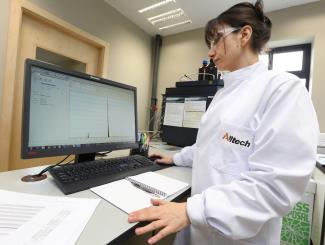 On Tuesday, March 31st., 2020, at 15H00 EDT., Dr. Max Hawkins, a member of the Alltech® Mycotoxin Management team, will host a webinar focused on the results of the 2019 Alltech Harvest Analysis, including a discussion on mycotoxin risks and their impact on monogastric and ruminant animals.
On Tuesday, March 31st., 2020, at 15H00 EDT., Dr. Max Hawkins, a member of the Alltech® Mycotoxin Management team, will host a webinar focused on the results of the 2019 Alltech Harvest Analysis, including a discussion on mycotoxin risks and their impact on monogastric and ruminant animals.
In 2019, the United States experienced excessive moisture during the growing season, resulting in increased mold growth, primarily Fusarium producing a variety of mycotoxins.
 The 2019 Alltech Harvest Analysis of 219 corn samples from across the U.S. conducted by the Alltech 37+® laboratory, showed that the samples contained eight mycotoxins per sample, on average, with a range of 0–18. The number of mycotoxins present is crucial, as feeds that contain multiple mycotoxins pose a greater risk to livestock performance and health than feeds containing only one or two since there is synergy among mycotoxins.
The 2019 Alltech Harvest Analysis of 219 corn samples from across the U.S. conducted by the Alltech 37+® laboratory, showed that the samples contained eight mycotoxins per sample, on average, with a range of 0–18. The number of mycotoxins present is crucial, as feeds that contain multiple mycotoxins pose a greater risk to livestock performance and health than feeds containing only one or two since there is synergy among mycotoxins.
Type B trichothecenes (DON) (at 90.9%) and emerging mycotoxins (at 96.3%) were the two most commonly occurring mycotoxin groups in all samples, while fusaric acid and zearalenone were present in 85 and and 55 percent of the samples respectively. The average values of the mycotoxins analyzed showed that DON (at 1,294 ppb) and zearalenone (at 156 ppb) were the major mycotoxins of concern. Maximum levels for type B trichothecenes (33,230 ppb), type A trichothecenes (162 ppb), zearalenone (2,894 ppb), fusaric acid (6,792 ppb), Penicillium (1,689 ppb) and fumonisin (19,614 ppb) all present a significant risk when fed to livestock and poultry.
The risk of contaminated corn to poultry is higher for layers and immature flocks, while broilers generally face moderate risk.
The first half of the webinar will focus on ruminants, register via this link, starting at 3:00 p.m. EDT. The monogastric presentation will follow at 3:30 p.m. EDT, register via this link. For more information on mycotoxin management, visit knowmycotoxins.com.